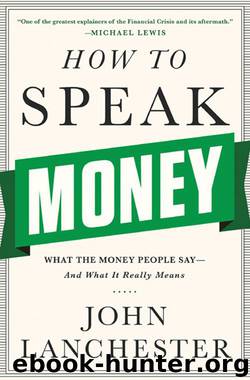How to Speak Money: What the Money People Say--And What It Really Means by John Lanchester

Author:John Lanchester [Lanchester, John]
Language: eng
Format: epub, mobi
Publisher: W. W. Norton & Company
Published: 2014-10-06T00:00:00+00:00
The bottom ten, counting down to number 168, are all in sub-Saharan Africa:
159. Burundi
160. Guinea
161. Central African Republic
162. Eritrea
163. Mali
164. Burkina Faso
165. Chad
166. Mozambique
167. Democratic Republic of Congo
168. Niger
McJobs Low-pay, low-status, low-security, low-prospects jobs of the sort done by workers in McDonald’s—hence the name.
mean and median The mean is the average: for any group, you add whatever it is you’re measuring together, divide it by the number of people in the group, and that’s the mean. The median is the person in the middle, with 50 percent above and 50 percent below. When the mean goes up and the median stays still, that is a sign of rising inequality. Imagine a football team whose star player gets a $1,000,000 pay raise. The team’s average pay will go up, but the median—the bloke in the middle—will be paid the same. That’s proof that inequality in the team has risen. In the Anglo-American world, the mean and the median have diverged sharply in the last few decades, as inequality has measurably increased. Only the people at the top are better-off; everyone else is finding life harder. In the United States there has been no increase in the median wage in the last three decades, even as average earnings have gone up sharply. That’s because most of the increase in pay is concentrated right at the top of the income distribution, with half of all the increase in income since 1980 going to the richest 1 percent of the population.
These facts weren’t prominent on the political radar screen before the economic crisis, but the hard times through which most people are now living have made them increasingly aware of the gap between how most of them live and how the rich do. It’s one thing to be told that the rich are getting a bigger slice of the cake while the whole cake is growing and your own slice of the cake is also getting bigger. It’s another thing when the cake is shrinking, but the rich person’s slice is continuing to grow.
mercantilism The discredited economic doctrine that dominated economic and foreign policy in Europe for hundreds of years: the idea that countries’ economic interests are competing and not cooperative, and that countries should export their way to riches, at the expense of their neighbors. It implies the development of captive overseas markets, often in the form of colonies, and also of protective tariffs and taxes.
Merkel’s numbers A piece of data much quoted by Angela Merkel, the German chancellor: 7/25/50. Europe has 7 percent of the world’s population, 25 percent of its GDP, and 50 percent of its social spending.
microeconomics and macroeconomics The biggest distinction in the field of economics: it’s not an ideological divide; it’s just a categorical separation between the different kinds of work that economists do. Macroeconomics was born in the aftermath of the Great Depression, and is the attempt to understand economies on large scales, everything from taxes to trade, fiscal and monetary policy, balance of payments, and all that stuff.
Download
How to Speak Money: What the Money People Say--And What It Really Means by John Lanchester.mobi
This site does not store any files on its server. We only index and link to content provided by other sites. Please contact the content providers to delete copyright contents if any and email us, we'll remove relevant links or contents immediately.
International Integration of the Brazilian Economy by Elias C. Grivoyannis(111059)
The Radium Girls by Kate Moore(12028)
Turbulence by E. J. Noyes(8049)
Nudge - Improving Decisions about Health, Wealth, and Happiness by Thaler Sunstein(7706)
The Black Swan by Nassim Nicholas Taleb(7129)
Rich Dad Poor Dad by Robert T. Kiyosaki(6632)
Pioneering Portfolio Management by David F. Swensen(6300)
Man-made Catastrophes and Risk Information Concealment by Dmitry Chernov & Didier Sornette(6019)
Zero to One by Peter Thiel(5802)
Secrecy World by Jake Bernstein(4753)
Millionaire: The Philanderer, Gambler, and Duelist Who Invented Modern Finance by Janet Gleeson(4478)
The Age of Surveillance Capitalism by Shoshana Zuboff(4292)
Skin in the Game by Nassim Nicholas Taleb(4248)
The Money Culture by Michael Lewis(4207)
Bullshit Jobs by David Graeber(4190)
Skin in the Game: Hidden Asymmetries in Daily Life by Nassim Nicholas Taleb(4006)
The Dhandho Investor by Mohnish Pabrai(3764)
The Wisdom of Finance by Mihir Desai(3747)
Blockchain Basics by Daniel Drescher(3582)
